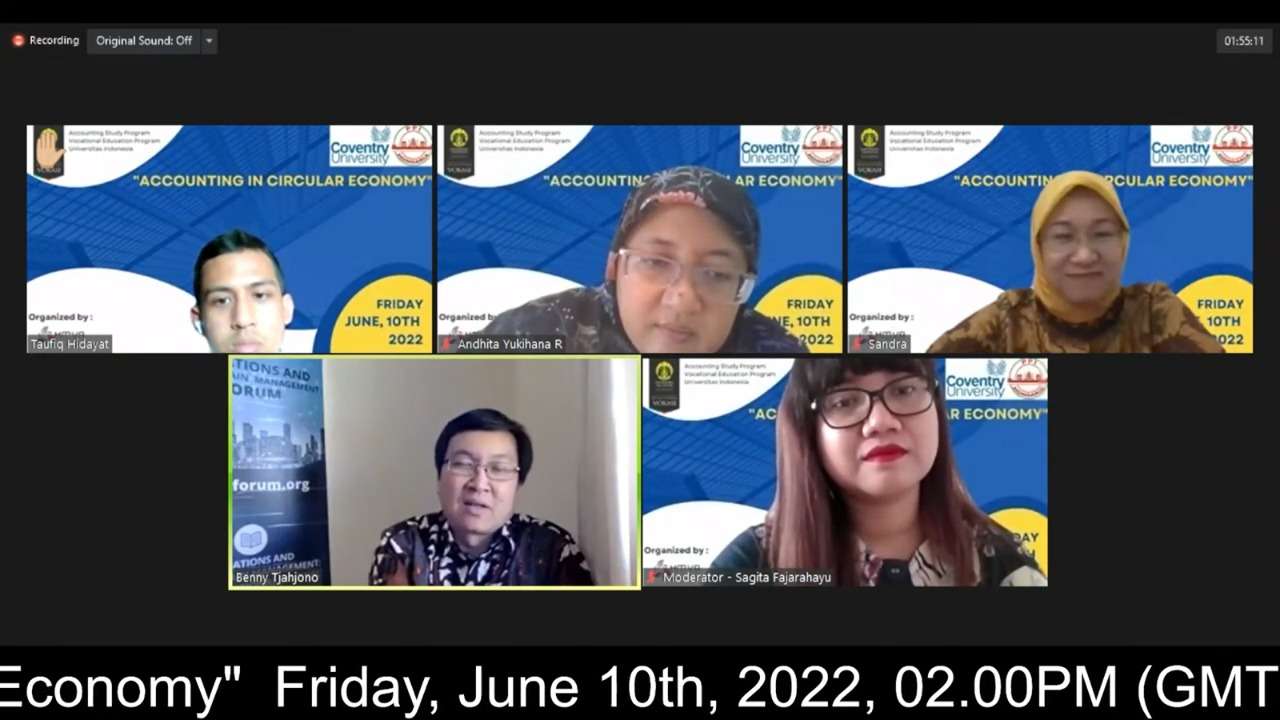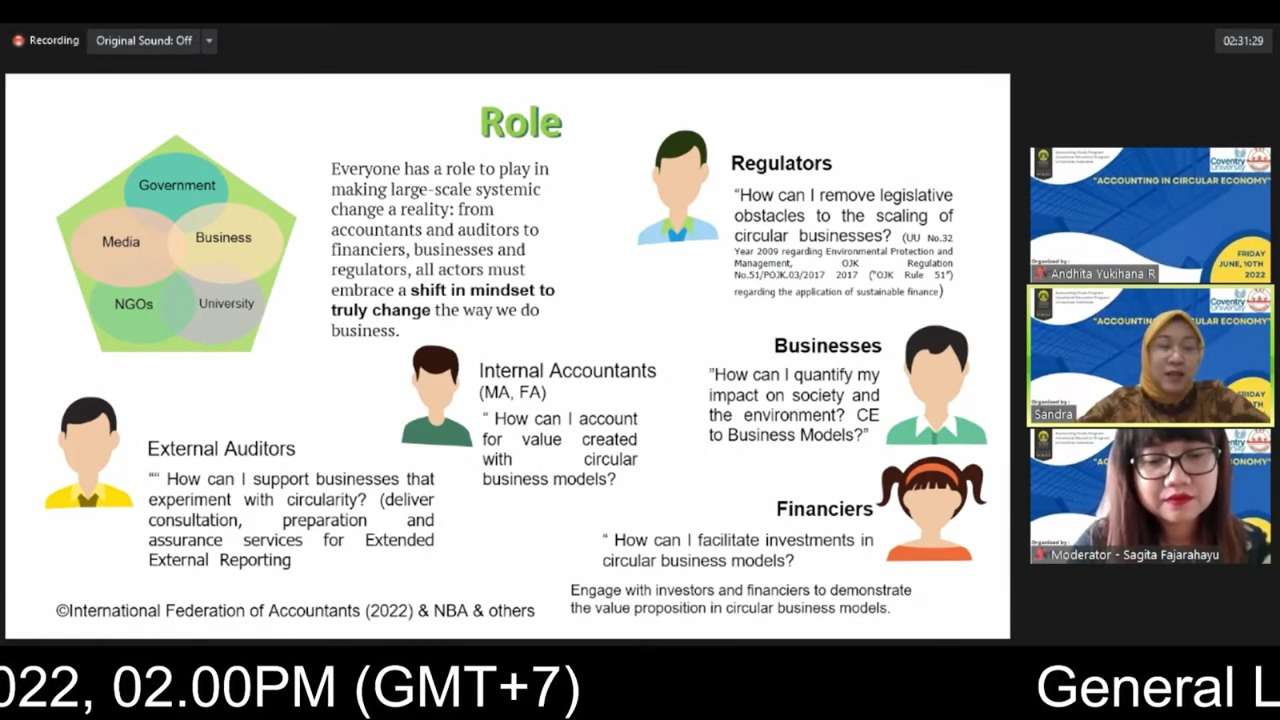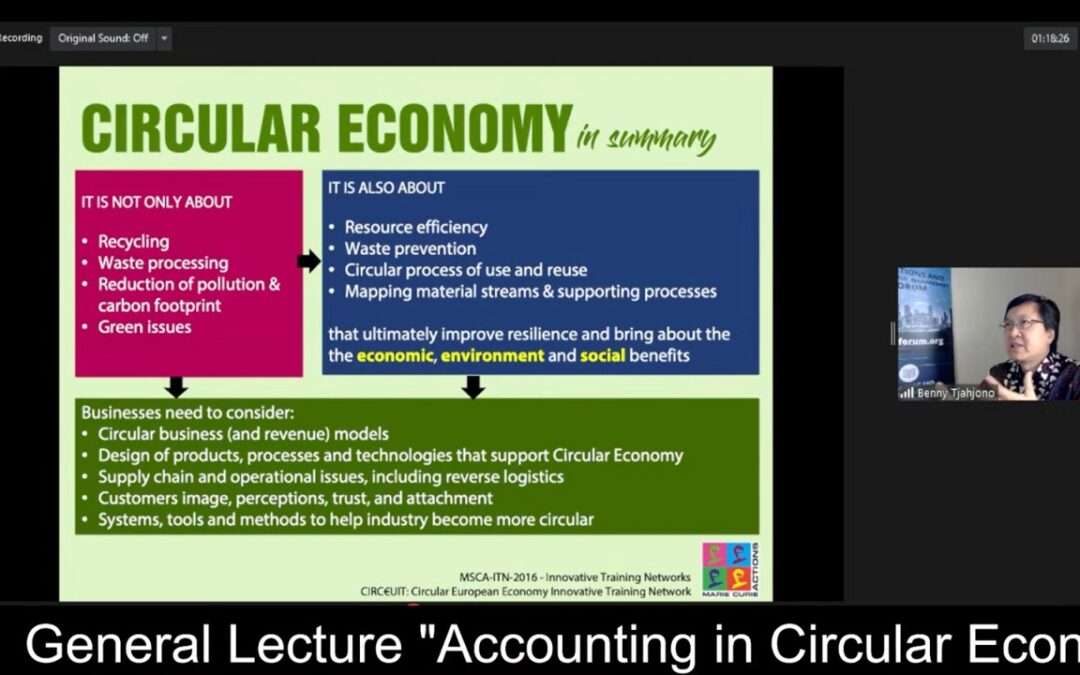Depok-The industrial world in Indonesia is faced with future sustainability goals to meet the 12th Sustainable Development Goals (SDGs), namely Responsible Consumption and Production. To achieve this target, the government has begun to promote the circular economy concept in various industries since the last few years. Accurate data related to reports, challenges, and opportunities on the impact of the circular economy is very much needed to achieve efficient target fulfillment.
The Vocational Education Program at the Universitas Indonesia (UI) through the Accounting study program also plays a role in supporting the government to transform the economy towards a more “green” direction or often referred to as a circular economy. UI Vocational Accounting Study Program held an inbound lecture entitled “Accounting in Circular Economy” which was held online last Friday, June 10, 2022.
Present as a resource person Prof. Benny Tjahjanto, Ph.D, who is Professor of Sustainability and Supply Chain Management who also co-leader of the Sustainable Production and Consumption cluster at the Center for Business in Society (CBiS) at Coventry University, England, and lecturer of the UI Vocational Accounting study program, Sandra Aulia Z., SE, Ak., M.S.Ak., CA, CPA, CICS, CRMP, CACP.
Benny said that increasing the carbon footprint in Indonesia has a big impact on the environment. “The increase in carbon footprint is triggered by residues from various industrial products that are not reprocessed so that they have an impact on the surrounding environment. The implementation of the circular economy is one of the strategies that companies can use to reduce the carbon footprint in Indonesia,” said Benny.
Circular economy is an alternative concept from linear economy (create, use, dispose) into products that can be used continuously. The resources used can be used as long as possible by extracting the maximum value of their use, then recovered and regenerated into other products. Thus, the presence of waste is eliminated as much as possible because the concept seeks to use renewable energy.
 (Photo: Discussion between speakers and audience regarding the circular economy)
(Photo: Discussion between speakers and audience regarding the circular economy)
Several circular economy business models can also be carried out by companies to meet zero waste targets in the future. The business model consists of four things, namely: 1) dematerialization; 2) products/services on demand; 3) recovery of secondary materials/by-products; 4) repair, refurbish, remanufacture, and recondition; also 4) performance based (Pay per use) – Product Service Systems (PSS).
Benny added, “Circular economy is not only a concept that emphasizes recycling, waste treatment processes, reducing pollution and carbon footprint, but also efforts to prevent waste, resource efficiency, circular processes of use and reuse, and mapping of material flows and supporting processes. ”
To find out the amount of data, processes, and opportunities in implementing the circular economy, it is necessary to have an accounting role in it. Sandra explained that the accounting profession association in Indonesia provides full support for achieving the zero waste target through a circular economy strategy. “The government has made policies regarding data reporting in the form of the number of opportunities, obstacles, and benefits from the circular economy for every company that processes products,” Sandra explained.
 (Photo: Presentation by Sandra on the role of accountants in assisting the implementation of the circular economy)
(Photo: Presentation by Sandra on the role of accountants in assisting the implementation of the circular economy)
The role of accounting in the circular economy is demonstrated by research and analysis on the value of processed products to become residues, as well as reprocessing them to become recycled products and remain valuable.
The Director of the UI Vocational Education Program, Padang Wicaksono, S.E., Ph.D, said that education about the circular economy concept for the general public, especially students, is an important thing that needs to be known and understood. “The circular economy concept can also be applied to students who are currently starting a business by maintaining resources that can be used as long as possible, as well as restoring and regenerating products continuously,” said Padang.


